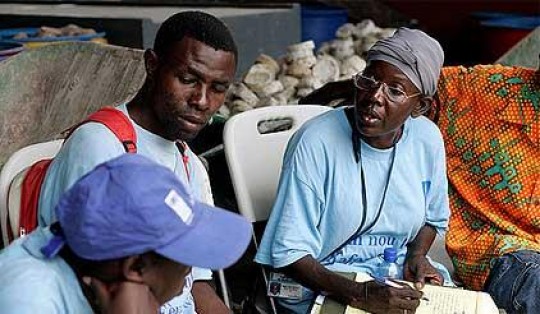Haitian earthquake boosted global commitment to disaster risk reduction
Haitian earthquake boosted global commitment to disaster risk reduction
 Participants in the cash-for-work programme, through which UNDP has been providing short-term employment to 75,916 Haitians so far who are laying the foundations for long-term recovery while earning an income.
Participants in the cash-for-work programme, through which UNDP has been providing short-term employment to 75,916 Haitians so far who are laying the foundations for long-term recovery while earning an income.
Geneva, 12 January 2012 – On the occasion of the two-year commemoration of the Haitian earthquake today, the UN Secretary General’s Special Representative on Disaster Risk Reduction, Margareta Wahlström, recognized the significant progress made over the last two years in dealing with the consequences of the disaster which took over 220,000 lives and left hundreds of thousands homeless. She issued the following statement:
“The resilience of the Haitian people over the last two years has been heroic as they seek to recover from a disaster of enormous magnitude. They have accomplished much in their efforts to re-build their country and re-house their people while also coping with other calamities including cyclones and an on-going cholera epidemic.
“While much has been accomplished, more needs to be done to absorb the lessons from this terrible tragedy. UNISDR invites the new Government to give priority to the issue of disaster risk reduction and also urges the donor community to maintain support to the Haitian Government’s efforts in this area. Recent successful initiatives such as a UN and EC supported seismic resilience programme in the northern region of Cap Haitian and a national simulation exercise at the start of the hurricane season last year need to be expanded on.
“The tragedy helped to create a greater global understanding of the importance of disaster risk reduction in contexts of rapid urbanization, seismic risk, population growth and widespread poverty. It confirmed that the authorities need to take the subject of risk reduction seriously, even in cities and regions that may not have experienced earthquakes or related tsunamis for hundreds of years. The UN is adapting its approaches to assessing risk to natural hazards to ensure that such potentially devastating events are better understood.
“Encouragingly, the numbers of countries reporting on their implementation of the international blue-print for disaster risk reduction, the Hyogo Framework for Action 2005-2015: Building the Resilience of Nations and Communities to Disasters is now over 130. Many of them are applying the lessons learned from Haiti.
“I look forward to visiting Haiti in March and discussing with the new government how the UN Office for Disaster Risk Reduction, UNISDR, can support existing initiatives in the country and contribute to making disaster risk reduction a national development priority.”
###
> United Nations (UN).
 The United Nations was established on 24 October 1945 by 51 countries committed to preserving peace through international cooperation and collective security. Today, nearly every nation in the world belongs to the UN: membership totals 192 countries.
The United Nations was established on 24 October 1945 by 51 countries committed to preserving peace through international cooperation and collective security. Today, nearly every nation in the world belongs to the UN: membership totals 192 countries.
When States become Members of the United Nations, they agree to accept the obligations of the UN Charter, an international treaty that sets out basic principles of international relations. According to the Charter, the UN has four purposes:
- to maintain international peace and security;
- to develop friendly relations among nations;
- to cooperate in solving international problems and in promoting respect for human rights;
- and to be a centre for harmonizing the actions of nations.
###
* The above story is adapted from materials provided by United Nations (UN)
** More information at United Nations (UN)




















